Publications
Quick Links
Receive
Notifications
If you would like to receive emails about our publications, news, and events, please sign up here.
Can't find it? Please contact us.
The 2024 Massachusetts Employer Survey (MES)
|
|
|---|---|
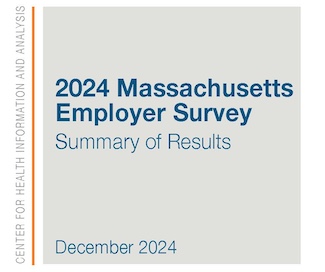 |
New! The Massachusetts Employer Survey (MES) asking a representative sample of employers to share their experiences and challenges in offering health insurance and related benefits to their employees. The MES provides valuable insights into the employer health insurance market The latest survey includes new analyses of firm contributions to health reimbursement arrangements (HRAs) and health savings accounts (HSAs) offered in conjunction with high deductible health plans (HDHPs); telemedicine coverage and modality; and the types of services provided by an agent, broker, or consultant during employer benefit decision-making. |
DataMatters
|
|
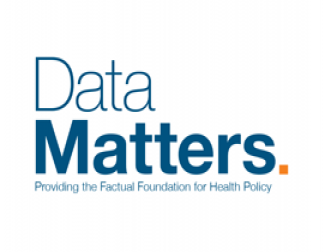 |
This issue of DataMatters highlights CHIA's Case Mix datasets for hospital inpatient discharge data (HIDD), emergency department data (EDD), and outpatient observation data (OOD).Earlier this fall, CHIA also published the latest quarterly hospital and health system financial performance report, with data through June 30, 2024. The CHIA “Data User Profile” segment, focuses on research using the MA APCD to explore the application of fluoride during children’s dental visits. You can also catch up on upcoming health care-related events and all recent publications by CHIA. |
Case Mix Dashboards
|
|
 |
Under state law, CHIA maintains databases of patient encounters with acute care hospitals. Collectively known as Case Mix, the databases capture each inpatient admission, emergency department visit, and outpatient observation stay and includes the medical reason for the visit, procedures and services provided, charges incurred, and duration of the visit, as well as patient demographics. CHIA's latest interactive dashboards on outpatient observation (OOD), emergency department (ED) visits and hospital inpatient discharge data (HIDD). |
| DataMatters (September 2024) |
|
|---|---|
 |
Two things distinguish CHIA in the pursuit of improving the Massachusetts health care system: our public-interest perspective, and our unique data sets. CHIA's data sets are unique because as the state agency responsible for a number of health care statistics, we have the ability to collect information necessary to fulfill this responsibility. The September 2024 issue of DataMatters highlights CHIA's latest publications while also including a Data User Profile and a listing of upcoming events and conferences of interest. |
| Massachusetts Enrollment Trends Through March 2024 (September 2024) |
|
 |
Twice per year, CHIA updates its detailed Enrollment Trends analysis for the most recent two-year period to give researchers and policymakers insight into the market. The latest edition covers the period between March 2022 and March 2024 and includes breakouts by payers and product types in private commercial and public market sectors. Enrollment Trends reporting includes an interactive dashboard, a detailed databook, and technical appendix. Coverage is defined by unique Massachusetts residents with primary, medical membership in the 12 largest commercial payers, MassHealth (Medicaid), or Medicare. |
| Massachusetts Behavioral Care (September 2024) |
|
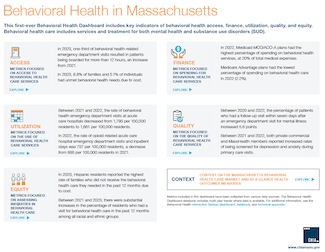 |
CHIA has produced its inaugural dashboard of metrics to monitor the performance of behavioral health care in the Commonwealth Behavioral health encompasses services and treatment for both mental health and substance use disorders (SUD), an array of vital services that can meaningfully shape patient outcomes and measuring and tracking indicators of behavioral health care provides an essential fact base that enables data-driven policymaking and delivery system reforms. |
| Annual Massachusetts Acute Hospital and Health System Financial Performance Report (September 2024) |
|
 |
CHIA's Massachusetts Acute Hospital and Health System Financial Performance Report for hospital fiscal year (HFY) 2023 found that overall acute hospital profitability, as measured by median total margin, was 2.2%—an increase of 6.4 percentage points from 2022; the statewide acute hospital median operating margin was 0.2% in HFY 2023—an increase of 1.5 percentage points from 2022. In addition to these profitability findings, this publication also reports on the liquidity and solvency of hospital health systems and their affiliated acute hospitals, as well as the profitability of affiliated physician organizations. |
| Primary Care and Behavioral Health Care (PCBH) Spending (August 2024) |
|
 |
Primary care and behavioral health comprise an array of vital services that can meaningfully shape patient outcomes and is foundational to a well-performing Massachusetts health care system. As part of its efforts to inform policy initiatives, investments, and delivery system reforms, CHIA reports on payments made by health plans to health care providers, including the amounts paid by the payer as well as member-cost sharing, delivering primary care and behavioral health services. |
| HIDD, EDD and OOD Dashboard Updates (August 2024) |
|
 |
Under state law, CHIA maintains acute care hospital data going back more than 30 years. Collectively known as Case Mix, these databases capture inpatient admissions, emergency department visits, and outpatient observation stays at acute care hospitals in Massachusetts. These ongoing series of reports establish an important baseline of hospital utilization that can be used for public health initiatives, analyses of preventable hospitalizations and readmissions, and comparative cost and outcomes research. |
| A Focus on Provider Quality: Selected Clinical Measures, 2020 and 2022 (August 2024) |
|
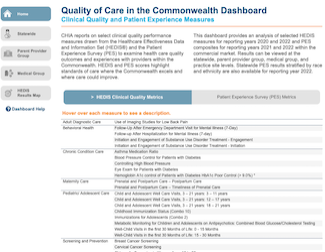 |
As part of CHIA’s ongoing work to monitor health care quality in the Massachusetts, Select Clinical Quality and Patient Experience Measures, 2020–2022 examines performance across a subset of metrics from the NCQA Healthcare Effectiveness Data and Information Set (HEDIS®) and the Patient Experience Survey (PES). New in this year’s report, stratified statewide PES results are available for reporting year 2022 to examine disparities in patient-reported experiences across racial and ethnic groups. |
| Relative Price (July 2024) |
|
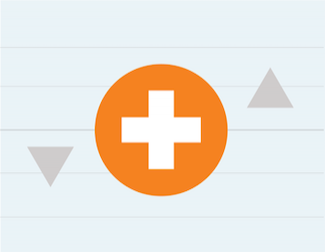 |
CHIA reports annually on relative price to examine provider price variation in Massachusetts. Relative Price (RP) facilitates comparison of average provider prices while accounting for differences in patient acuity, the types of services providers deliver to patients, and the different insurance product types (e.g., HMO, PPO) that payers offer to their members. CHIA published relative price results with data through CY 2022 for Massachusetts hospitals and physician groups. CHIA also produced an interactive dashboard which allows users to explore the data in more detail. |
| DataMatters (July 2024) |
|
 |
In this issue of DataMatters, CHIA focuses on the publication of provider price variation for CY 2022, as well as other recent research including the results for the Massachusetts Health Insurance Survey (MHIS). |
| The Massachusetts Health Insurance Survey (MHIS) (June 2024) |
|
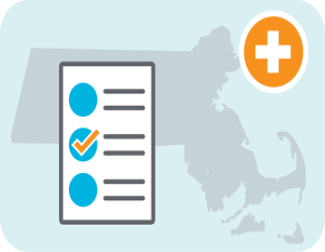 |
The Massachusetts Health Insurance Survey (MHIS) provides information on health care coverage, access and affordability trends in the Commonwealth as part of CHIA’s Continuing Study on Insurance Coverage, Underinsurance and Uninsurance. The MHIS is a tool used by CHIA, legislators, policymakers, employers, insurers and other stakeholders to track and monitor the experiences of Massachusetts residents in obtaining timely and affordable health care. While national data sources can help monitor some aspects of health care coverage, access and affordability this survey provides the ability to track issues that are specific to Massachusetts. |
| Cost or Utilization? Drivers of Commercial Prescription Drug Spending (June 2024) |
|
 |
CHIA's latest data visualization explores the drivers of commercial prescription drug spending as a special supplement to CHIA’s latest report on this topic. Prescription drug spending has consistently been a major driver of total health care spending in Massachusetts, which has a direct impact on residents. Data shows that while pharmacy spending trends are based on both the cost of prescription drugs as well as the number of prescriptions filled, the primary driver of spending growth is the increase in costs. |
| Prescription Drug Use and Spending (June 2024) |
|
 |
CHIA has released its latest analysis on commercial prescription drug use and spending in an effort to shine a light on the drivers of pharmacy expenditures, including high volume and high-cost drugs. CHIA’s dashboard and detailed dataset, allows users to see drivers of prescription drug spending as well as the associated conditions these drugs treat. For this analysis, CHIA used commercial pharmacy claims from the agency’s All-Payer Claims Database (APCD) to identify high volume and high-cost drugs between 2018-2022. |
| OOD, HIDD, and ED Dashboards (May 2024) |
|
 |
CHIA published its first interactive dashboard on acute care hospital outpatient observation visits. Observation visits are classified as outpatient care and may serve a variety of functions, including the assessment of patients who may require additional diagnostic or therapeutic treatment beyond care in an emergency department, but do not require admission to the inpatient setting. CHIA has also updated both our inpatient and emergency department dashboards sourced from our Case Mix Data reporting. These dashboards outline hospital utilization and can be used for public health initiatives, analyses of preventable hospitalizations and readmissions, and comparative cost and outcomes research. |
| DataMatters (May 2024) |
|
 |
In this issue of DataMatters, we discuss our new interactive dashboard on acute care hospital outpatient observation visits. We also have a Q&A with how CHIA 's APCD data was used to asses disparities in health care delivery for children with medical complexities. |
| Massachusetts Health Care Workforce Survey (May 2024) |
|
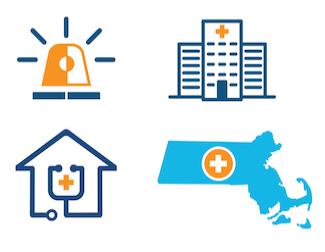 |
Massachusetts health and human service providers are experiencing unprecedented workforce shortages. Additionally, the lack of diversity in the health care workforce adversely affects the health outcomes of people of color. These distinct, but related issues of workforce capacity and diversity have clear consequences for access to care, quality of care, cost, and health outcomes. CHIA's Massachusetts Health Care Workforce Survey (MHCW) collected information on staffing capacity and diversity across 10 key sectors. The interactive dashboard aims to supply a critical fact base to inform policies and programs and support ongoing monitoring of workforce trends in the health and human service sectors. |
| Primary Care Dashboard (May 2024) |
|
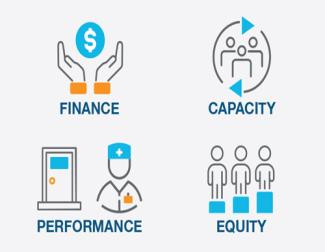 |
A high-functioning primary care system can lead to better patient outcomes, lower costs, and more equitable care. CHIA, in collaboration with Massachusetts Health Quality Partners has published the latest primary care dashboard to monitor the health of the primary care system in the Commonwealth. This is the second iteration of the dashboard, which includes new measures on childhood immunization status as well as data around medical school graduates entering the primary care field. |
| DataMatters (March 2024) |
|
 |
In the March issue of DataMatters, CHIA explores recent medical spending trends across Massachusetts. This first-time analysis explores the relationship between community characteristics and total medical expenses by insurance population and service categories. Read more about this new reporting series in the “News You Can Use” section. We also feature work from the Health Policy Commission using the Massachusetts All-Payer Claims Database (MA APCD) in the “Data User Profile” segment, for their analysis of shifts in where commercially insured residents in Massachusetts received their flu vaccines. |
| The Annual Report on the Performance of the Massachusetts Health Care System (March 2024) |
|
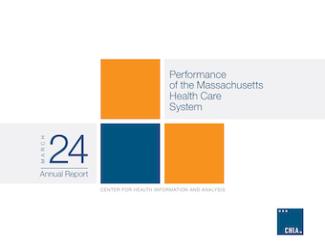 |
The Annual Report on the Performance of the Massachusetts Health Care System examines trends in costs, utilization, coverage, and quality indicators through 2022, a period following two years of unprecedented volatility in the health care system due to the COVID-19 pandemic. New this year, the report includes a chapter on health care affordability that presents a consumer-centric picture of rising health care costs and its downstream implications, as well as a section and interactive dashboard that provides comparative insights into how medical spending varies by community demographics. |
| Enrollment Trends - September 2021 through September 2023 Data (March 2024) |
|
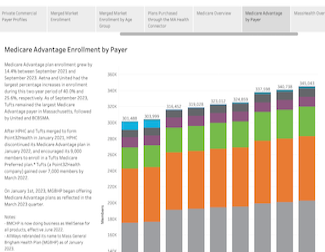 |
Twice per year, CHIA updates its detailed Enrollment Trends analysis for the most recent two-year period to give researchers and policymakers insight into the market. The latest edition covers the period between September 2021 and September 2023 and includes breakouts by payers and product types in private commercial and public market sectors. Enrollment Trends reporting includes an interactive dashboard, a detailed databook, and technical appendix. Coverage is defined by unique Massachusetts residents with primary, medical membership in the 12 largest commercial payers, MassHealth (Medicaid), or Medicare. |
| Reports on Massachusetts Acute Hospital Case Mix Databases (February 2024) |
|
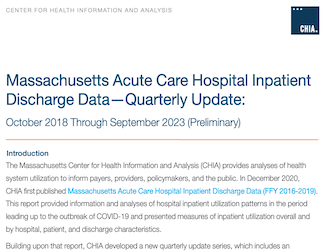 |
Under state law, CHIA maintains databases of patient encounters with acute care hospitals. Collectively known as Case Mix, the databases capture each inpatient admission, emergency department visit, and outpatient observation stay and includes the medical reason for the visit, procedures and services provided, charges incurred, and duration of the visit, as well as patient demographics. CHIA's latest interactive dashboards on emergency department (ED) visits and hospital inpatient discharge data (HIDD). show trends from October 2018 – September 2023. |
| Massachusetts Hospital Profiles (February 2024) |
|
 |
Hospitals and hospital health systems play a crucial role in the Massachusetts health care delivery system. CHIA is responsible for providing meaningful analysis on hospital and health systems through various measures and reporting. In support of this goal, CHIA has released its most recent Hospital Profiles Massachusetts Hospital Profiles provide a valuable snapshot of performance metrics for each hospital and allow policymakers and stakeholders to further assess the effect the pandemic has had on hospitals and health systems in their district. |
| Continuous Skilled Nursing Care Biennial Report (January 2024) |
|
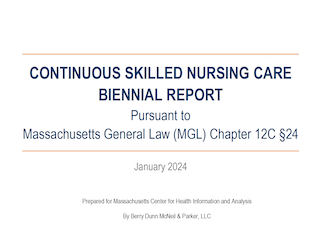 |
Massachusetts’ General Law Chapter 12C Section 24 requires the Center for Health Information and Analysis (CHIA), in conjunction with MassHealth, to provide a “biennial report on the provision of continuous skilled nursing [CSN] care as defined in 101 Code of Massachusetts Regulations (CMR) 361.” This biennial report is required to address eight questions, including an assessment of the degree to which hours of care authorized for CSN are delivered and an evaluation of rates paid for CSN care in the Commonwealth of Massachusetts (Commonwealth). |
